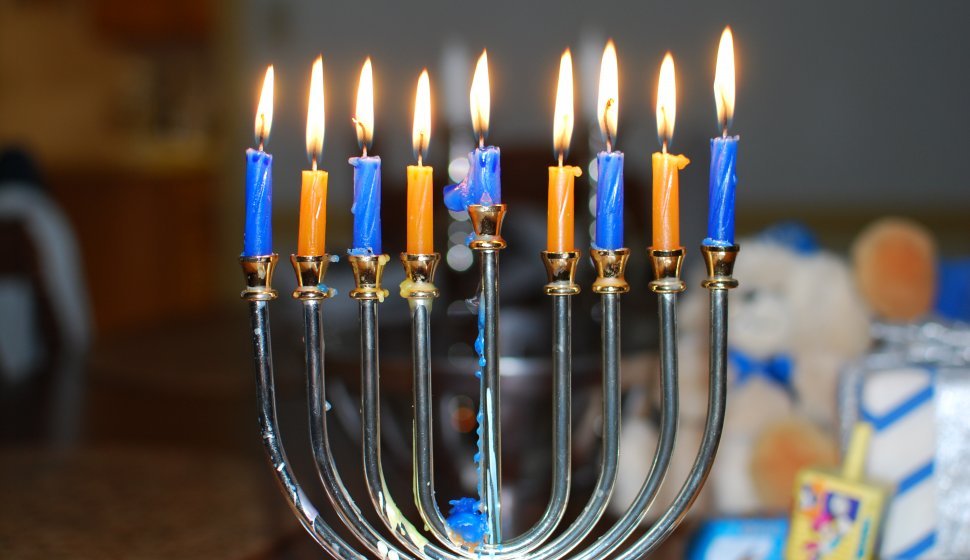- Home
- Celebrations
- Hanukkah

Hanukkah Dates in 2026, 2027 and 2028
Hanukkah is celebrated at the following dates:
- from Friday, 4, to Saturday, December 12, 2026
- from Friday, December 24, 2027 to Saturday, January 1, 2028
- from Tuesday, 12, to Wednesday, December 20, 2028
Hanukkah, also spelled Chanukah or Ḥanukkah, is a Jewish holiday celebrated according to the Jewish Calendar. It is observed either in November or December. More specifically, it occurs on the 25th day of Kislev and ends on the 2nd or 3rd day of tevet1.
Origin
Hanukkah commemorates the rededication of the Second Holy Temple in Jerusalem during the Maccabean Revolt against the Seleucid Empire. According to tradition, jews would hail in the Shabbat with candles that burn with ritualistic olive oil. According to the Talmud, after driving the forces of Antiochus IV out of the temple, almost all of the ritual oil had been profaned and only enough oil remained for the menorah to burn for one day. By a miracle, however, it burned for eight days. This bought the Maccabeans enough time to make more oil2.
Celebration
Hanukkah is celebrated over the course of eight days. On each of these eight days, one additional candle is lit on the Menorah until all of the candles are lit on the final night. Traditions include playing dreidel and eating oily foods such as doughnuts and latkes3. In Sephardic Jewish families, the candle is lit by the head of the household, whereas in Ashkenazic families, every member of the family lights the candles45. The candles are to be lit opposite of the Mezuza facing the street6.
Important vocabulary
- Second Holy Temple - The sacred Jewish temple that stood between 516BCE and 70CE to replace Solomon's temple that was destroyed by the Neo-Babylonian empire in 586 BCE
- Maccabean - The rebel Jewish army that took control of Judea when it was part of the Seleucid Empire and reduced the influence of Hellenistic Judaism, which combined greek culture with Jewish religious tradition
- Talmud - the central text of Rabbinic Judaism
- Antiochus IV - Greek king of the Seleucid Empire from 165BCE to 164BCE
- Menorah - a nine-branched candelabrum is used for the celebration of Hanukkah as opposed to the seven-branched menorahs used in the second temple and by Moses as a portable sanctuary
- Dreidel - a Jewish variant on the European gambling toy, the teetotum, which bears and acronym for “Nes Gadol Hayah Sham,”which translates to “a great miracle happened there.”
- Kislev - The ninth month of the religious year and the third month of the civil year, usually occurring in November and December.
- Tevet - The tenth month of the religious year and the third month of the civil year, usually occurring in December and January.
- Seleucid Empire - A Hellenistic (greek) state existing between 312BCE and 63BCE that included Anatolia, Persia, the Levant, Mesopotamia, and what is now Kuwait, Afghanistan, and parts of Pakistan and Turkmenistan in addition to territories conquered by Alexander the Great.
- Shabbat - the seventh day of the Jewish holy week meant as a day of rest and observance.
- Sephardic Jews - An ethnic Jewish division arising out of the Iberian peninsula around 1000BCE.
- Ashkenazic Jews - An ethnic Jewish division arising out of the Holy Roman Empire around the year 1000
- Mezuza - A piece of parchment inscribed with a specific verse from the Torah. In Rabbinic Jewish households, it is placed on doorframes.
References
http://www.chabad.org/holidays/chanukah/article_cdo/aid/102978/jewish/The-Story-of-Chanukah.htm
http://www.chabad.org/holidays/chanukah/article_cdo/aid/603267/jewish/What-is-a-Dreidel.htm
http://www.myjewishlearning.com/jewish-and/sephardic-hanukkah-traditions/
http://www.myjewishlearning.com/article/sephardic-ashkenazic-mizrahi-jews-jewish-ethnic-diversity/
http://www.chabad.org/holidays/chanukah/article_cdo/aid/103868/jewish/Menorah-Lighting-Guide.htm
